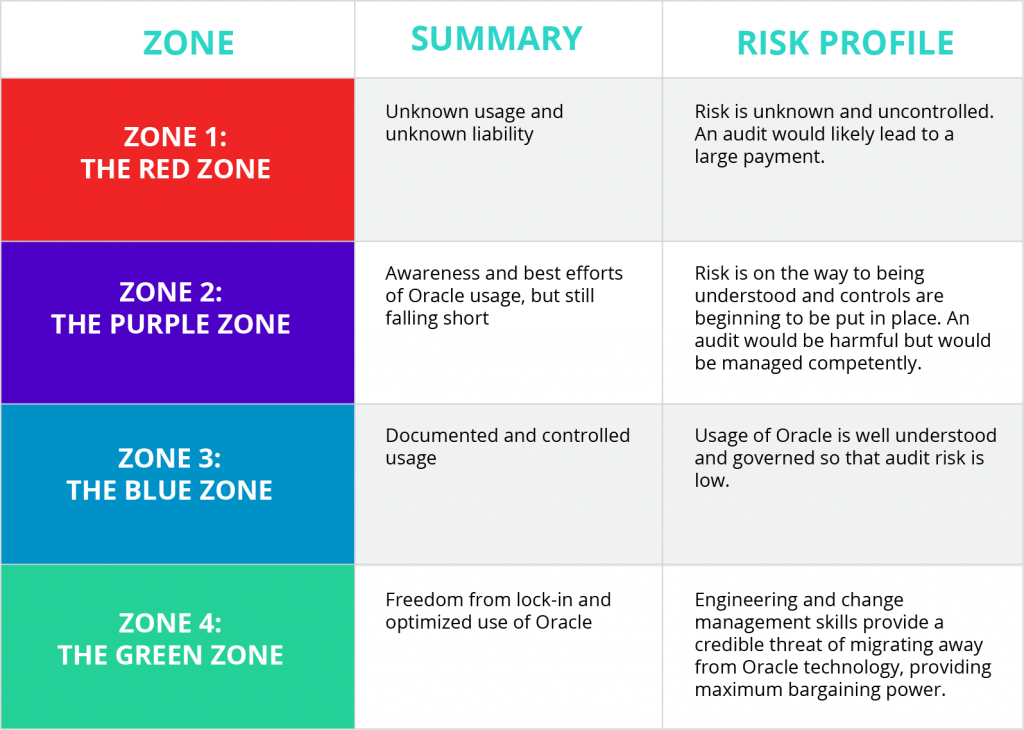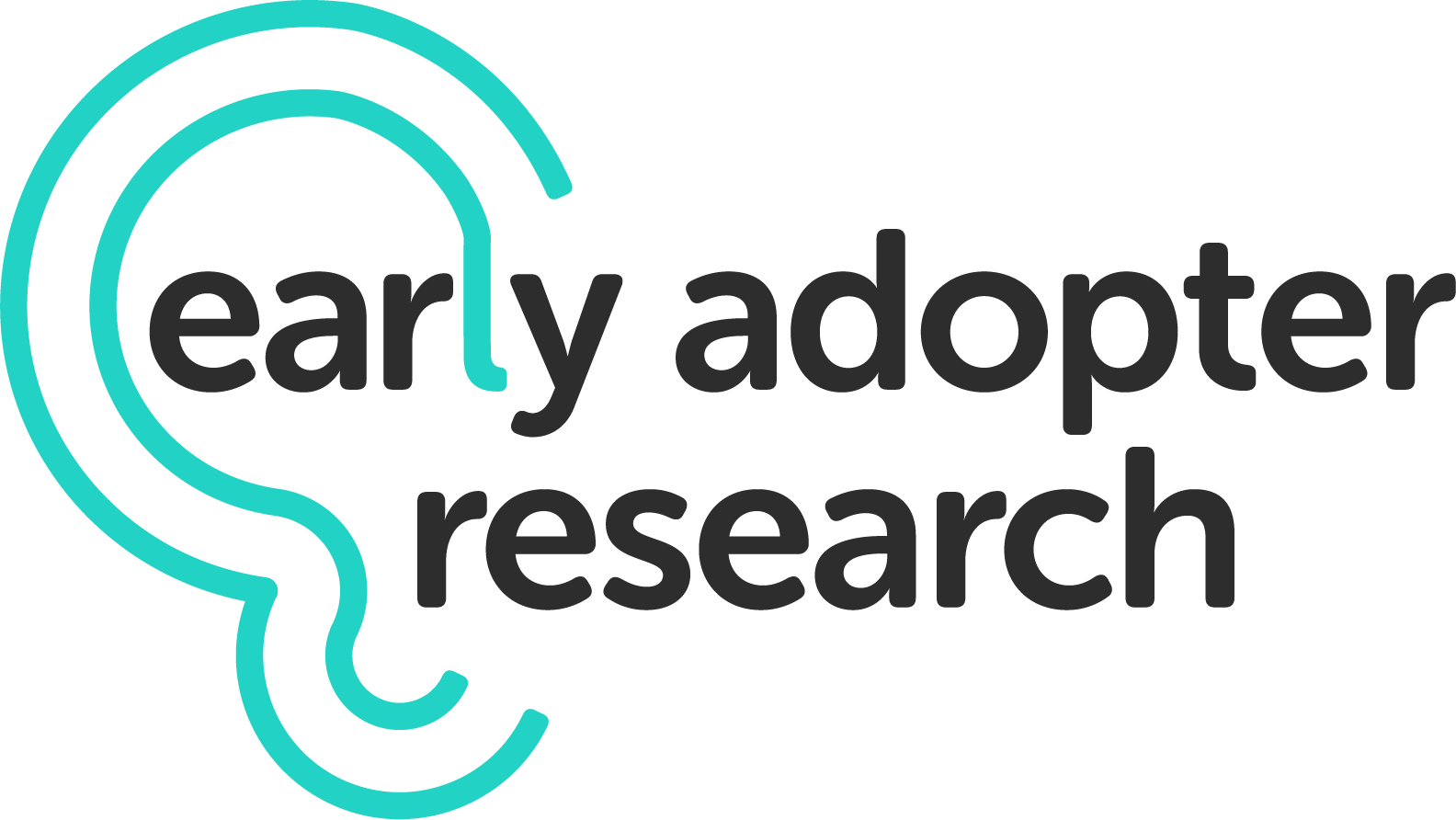Four Zones of Freedom from Oracle

The Escape Hatch from Oracle research mission is designed to help companies gain power in their negotiations with Oracle.
As reported in other Episodes of this Research Mission and in our other writing, Oracle’s unique licensing model is designed to give Oracle the upper hand in negotiations.
This article offers a framework to assess your current situation so that you can make a plan to increase your negotiating power. The goal is that your Oracle usage radiates needed value instead of a being a constant source of anxiety that an audit may lead to a large bill for technology you don’t want.
To help in this effort, we have defined a self-diagnostic tool called the Four Zones of Freedom from Oracle.

Zone 1: The Red Zone – Unknown Usage and Unknown Liability
The red zone is the worst place to be because in this zone you could be subject to an Oracle licensing audit that leaves you in a painfully weak bargaining position.
You’re in the red zone if you:
- Are unsure where Oracle license documents are.
- Do not clearly understand Oracle license documents and entitlements
- Do not have a process to control downloading and use of Oracle products
- Are unclear where Oracle products and premium features are being used across your IT estate.
- Do not monitor for unauthorized use of Oracle products.
- Do not have a playbook or plan for responding to an Oracle audit.
If you are in this situation, if Oracle audits and you provide all the information they request reflexively, it is likely that in any negotiations, Oracle will be able to demand a large payment. Often, Oracle directs such payments towards products that serve their business strategy, such as increasing adoption of Oracle Cloud. So you won’t only be paying for licenses negotiated from a weak bargaining position; you may be paying for technology that won’t help your business.
Zone 2: The Purple Zone – Awareness and Best Efforts, but Still Falling Short
The purple zone indicates you have started your assessment but didn’t realize how hard it is to solve this problem. In this zone, it often becomes clear that lax IT management and governance processes around Oracle are causing other problems and need to be cleaned up.
You are in the purple zone if you have:
- Found your Oracle licenses but are unclear what products you are entitled to.
- Made changes to your IT landscape, such as introducing virtualization, but are unclear how that has affected your usage from a licensing perspective
- Put a halt to unrestricted use of Oracle, but do not have a clear process for requesting new Oracle products.
- Not put a plan in place for how you would respond to an Oracle audit, but have identified consultants who could help if you are audited.
- Started a map of current Oracle usage but it is not clear that it is 100 percent accurate.
- Turned off some of the unused features of Oracle products but are unclear how much to turn off for all products.
In the purple zone, an IT staff knows that it they should be careful about using Oracle and managing their Oracle relationship, but they don’t know how to be careful.
In this situation, an audit will still be a big problem, but it is unlikely that it will be the worst case because it is clear that help is needed and will be obtained.
Zone 3: The Blue Zone – Documented and Controlled Usage
Companies in the blue zone have their Oracle relationship under control and are ready to face an audit from a position of strength. The IT management practices that enable a company to be in the blue zone are usually reflective of a high degree of competence and process discipline. You are in the blue zone if you:
- Have contracts and documentation of all Oracle license entitlements stored in an organized repository.
- Track and periodically analyze changes in Oracle licensing policies for their impact on existing Oracle entitlements.
- Anticipate future Oracle licensing moves and analyze the possible effects on Oracle licensing entitlements.
- Monitor use of Oracle products to ensure that you do not exceed entitlements
- Turn off unneeded features that increase licensing costs
- Established a well-defined process for requesting new Oracle products and preventing unauthorized installation
- Tightly control Oracle sales representatives’ access to your staff
- Have a plan of action for responding to an audit
- Have identified consultants, if needed, to support you in negotiating or responding to an Oracle audit
Companies in the blue zone are using Oracle products with confidence and are not overly worried about an audit. They know what they know and what they don’t know and get help from experts when needed.
Zone 4: The Green Zone – Optimized Use of Oracle
Companies in the green zone are essentially free from lock-in. Companies in the blue zone may be well aware of their Oracle usage, have it documented and controlled, but may not be able to exercise the ultimate threat that will get Oracle’s or any other vendor’s attention: The threat of leaving.
Companies in the green zone are the most powerful because they are able to make engineering-heavy transitions. Switching out one database for another doesn’t scare them. Nor does migrating from one application to another. Such companies are rare. You are in the green zone if you:
- Have a powerful engineering staff confident about making changes to infrastructure and applications.
- Have excellent change management processes and your staff is used to learning new ways of doing things and improving on existing methods.
- Implement technology architecture with an escape hatch, a migration plan to reduce lock-in
- Reduce lock-in by users through front ends, technology standards, open source, and APIs.
Perhaps the web-scale leaders such as Facebook, Amazon, and Google are the best examples of companies in the green zone. Amazon’s effort, for example, to rid itself of all Oracle technology, and their ability to actually pull it off, demonstrates the essence of a large green zone firm.
Oracle technology may be used in the green zone, but it is used because it is the best choice for the job, not because of lock-in or fear of change.
These four zones of freedom aim to serve as a self-diagnostic and planning tool that helps companies on their journey to empowerment. The Escape Hatch from Oracle Research Mission will show how this framework can be put to use.
The Escape Hatch From Oracle Research Mission is Sponsored by:
Oracle is a registered trademark of Oracle and/or its affiliates. Early Adopter Research is an independent firm and not associated with Oracle. © 2019 Early Adopter.









Leave a Comment